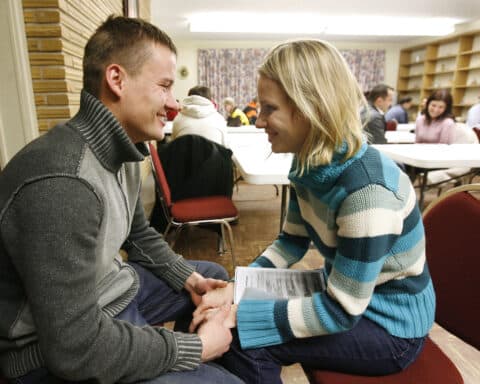Catholics in their 20s and 30s are recognizing the human and societal damage caused by widespread use of contraceptives, and they’re watching their peers begin to wake up to the health problems it causes, even if they don’t yet see the deeper consequences.
“It’s like a poison that someone has been putting in our food that tastes weird, but you can’t quite figure out what’s wrong with it,” said Andrew Ratelle, 30, of Minneapolis. “There’s something weird about it, it’s having bad effects, but you don’t know what it is.”
Raised in an era when contraceptive use is not only the norm but expected, Catholic millennials who are familiar with Blessed Pope Paul VI’s 1968 encyclical Humanae Vitae — which reaffirms Church teaching on birth control — see the effects on women’s bodies, relationships, the workforce and even in the #MeToo movement against sexual harassment and abuse.
Witnesses to fallout
Some of these Catholic young adults have embraced natural family planning (NFP) for both physical and spiritual reasons while their non-Catholic peers see it primarily as a natural alternative to contraception. Catholic millennials have personally seen friends divorcing in their 20s or bypassing marriage and parenthood to pursue careers. Others have friends who have been unable to conceive after long-term contraceptive use. They’ve also identified a mental health crisis resulting from contraception and abortion.
“I see [contraception] as something that has contributed to unhappiness,” said Lauren Enriquez, 30, who lives with her husband and three children in Kingwood, Texas. “I see it as something that has contributed to the skyrocketing abortion rate. I see it as a form of what I would almost call misogyny within the healthcare industry where women are being treated as if we can just be handed this panacea and then be forgotten about.”
Enriquez is PR manager for the pro-life organization the Human Coalition.
As Americans seek to live healthier, women are looking for better options than contraceptives, said Megan Miller, 27, of Libertyville, Illinois. “We’ve been fed this lie that this is the best and only option.”
Health-conscious women say they don’t want to take a pill or use an IUD proven to increase risks for blood clots, stroke, weight gain, depression and cancer against their natural fertility, but they don’t know what to do instead, said Rickard Newman, 37, of Lake Charles, Louisiana. Newman and his wife, Alana, 31, together with Springtime Productions, recently released the film “Sexual Revolution: 50 years since Humanae Vitae.”
When the Newmans tell the roughly 250 engaged couples they teach every year about modern NFP, many haven’t heard of it, he said.
Belittled sexuality
Because women are steered toward contraceptives, they don’t know how their bodies work, Miller said. “We had no idea until we were adults that you couldn’t just get pregnant any time,” she said. “The way NFP works, the way your body works is not anything I learned in biology, even with so many mandatory science classes.”
Besides the health risks, contraceptives reduce trust, foster dishonesty in relationships and give a false sense of security, Ratelle said.
“You reduce the likelihood of a child on the one hand, you also use that as an excuse to essentially ignore the degree to which people can join on all of those other levels,” he said. “It’s not just the actual physical flesh of a child. It’s the one-flesh union of your emotions, your souls, your minds; all of those things are being brought together.”
| Paul Vl’s Predictions are Now Reality |
|---|
|
Blessed Pope Paul VI predicted grave consequences of methods of artificial birth control in his 1968 encyclical, “Humanae Vitae.” Fifty years later, millennials are recognizing that four predictions of this soon-to-be canonized pope have come true in our time:
1. The general lowering of morality: Couples often recognize the high rates of divorce, infidelity and pornography.
2. Men losing respect for women: Women can speak about the horrors of hook-up culture, porn, Tinder, #MeToo and more.
3. Governments imposing contraceptive methods on their populations: Many are familiar with China’s one-child policy, forced sterilizations, the United States and the UN withholding foreign aid from countries that don’t embrace contraception, and the HHS contraceptive mandate.
4. People believing they have dominion over their bodies: This is seen with in vitro fertilization (IVF), surrogacy, transgenderism and euthanasia.
|
Contraception belittles the sexual act and allows people to objectify each other, said Megan Oliver, 28, of Minneapolis.
“When they don’t understand the depth of what they’re doing … it allows people to enter into what’s really a sacred act without entering into it as fully as we’re called to do,” she said. “On top of that, they’re excluding God from it.” Contraception has made it possible — and the norm — for women to enter the workforce and stay there rather than taking time off to raise their children, Oliver said.
Birth control gives women the illusion that they can and should have it all, Miller said. “In the sense that you can time it out perfectly and you can have 1.5 children, a dual-income household and day care. It’s all kind of within your control.”
On the micro level, the pill treats fertility like a disease, Ratelle said. “On the macro level, it is the root of general denial or even soft censorship where people are not allowed to talk about, and women are no longer able to admit to themselves, what it is they want out of life.”
The #MeToo movement shows that we’re tired of sexual assault and harassment in our culture, even though there isn’t yet enough awareness that these problems are connected to the contraception mentality of sex without consequences, Miller said.
A better way awaits
As millennials were taught that “sexual responsibility” meant using contraceptives, the capability of practicing virtue was discarded, Enriquez said. “I feel like that was so detrimental to my generation because if you’re raised being taught that you’re not capable of practicing virtue, what’s going to happen is you’re actually not going to practice virtue.”
Some are starting to see the problems, she said. “I think we’re getting to the point where we have to say there is something fundamentally flawed about what we were taught, but I don’t think that millennials have really come to that point yet.”
Going deeper than health concerns is probably scary for many millennials, Oliver said. “They know they’re probably not going to like what they find because there are some really hard questions that you need to ask yourself when you’re part of a culture where this is acceptable.”
Humanae Vitae gives deeper spiritual reasons why contraceptives are harmful, Enriquez said. “We basically view Humanae Vitae as something that was prophetic and something we should look to for a blue print on how to walk back some of the problems our culture is facing.”
Miller warned against Catholics seeming “angry in the way they speak about [it] and not very loving, so people don’t receive it well.” She stressed the importance of Catholics living their lives “in ways that people ask why they’re different.”





